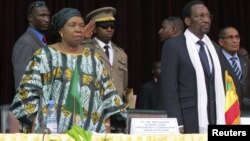The officials spent time in Burkina Faso, Mali and Niger, visiting flood zones, health centers and refugee camps, and talking to local leaders and civil society. United Nations officials say the mission’s aim is to draw attention to conditions in the Sahel, as well as identify the greatest remaining needs and plan future assistance.
In many parts of the Sahel, the takeover of northern Mali by Islamic extremist groups has further burdened communities already facing hunger. In recent months flooding, locust invasions and cholera outbreaks have complicated conditions.
The United Nations says more than 18 million people in West Africa’s Sahel region - which stretches from Senegal to Chad - are at risk from food shortages and malnutrition. Since early 2012 governments and aid agencies have already provided food and nutrition aid, but significant needs remain.
Clémence Traoré is social affairs minister in Burkina Faso, where the U.N. says about 34,000 Malians have sought refuge. As it is, some 2.8 million people in Burkina face food shortages, with 100,000 children at risk of severe malnutrition.
She says, we must continue to support Malians who have fled to Burkina Faso. We don’t know when the crisis in Mali will end, she says, and with the threat of fighting there we could even see another wave of refugees.
The interim Malian government and regional organizations are finalizing plans for a West African military intervention to take back northern Mali from the al-Qaida linked groups. Observers say the action could still be months away.
Minister Traoré added that it is also critical to help Burkinabé communities hosting Malian refugees.
Inside Mali, the United Nations estimates that one-third of the country’s 15.8 million people are in immediate need of humanitarian aid.
Donors have given nearly 60 percent of the $1.6 billion the U.N. says it needs for the Sahel region - Burkina Faso, Cameroon, Chad, Gambia, Mali, Mauritania, Niger, Nigeria and Senegal.
Pascal Karorero, U.N. representative in Burkina Faso, said communities need help not only to eat today but also to rebuild their livelihoods.
He says many people hit by this year’s food shortages have sold off their animals and other belongings. He says the idea is to help families re-establish their means of survival for future years.











